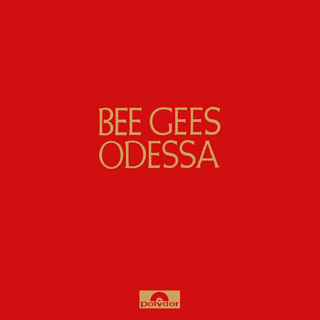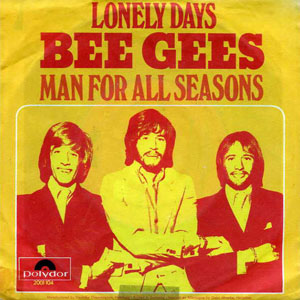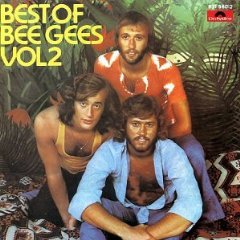Related Research Articles

Maurice Ernest Gibb was an English musician, singer, songwriter and record producer who achieved fame as a member of the Bee Gees. Although his elder brother Barry Gibb and fraternal twin brother Robin Gibb were the group's main lead singers, most of their albums included at least one or two songs featuring Maurice's lead vocals, including "Lay It on Me", "Country Woman" and "On Time". The Bee Gees were one of the most successful rock-pop groups of all time.

Sir Barry Alan Crompton Gibb is a musician, singer-songwriter and record producer who rose to worldwide fame as a co-founder of the group Bee Gees, one of the most commercially successful groups in the history of popular music. With his younger brothers, twins Robin and Maurice Gibb, he formed a songwriting partnership beginning in 1955. He has lived and worked in Britain, Australia, and the United States, currently holding dual UK–US citizenship.

Cucumber Castle is the seventh studio album by the Bee Gees, released in April 1970. It was produced by Barry Gibb, Maurice Gibb, and Robert Stigwood. It consists of songs from their television special of the same name, which was named after a song on their 1967 album Bee Gees' 1st. Cucumber Castle is the only Bee Gees album not to feature any recorded contributions from Robin Gibb, as he had left the group before the album was recorded.

Trafalgar is a 1971 album by the Bee Gees. It was their ninth album, and was released in September 1971 in the US, and November 1971 in the UK. The album was a moderate hit in the United States, and peaked at No. 34. The lead single "How Can You Mend a Broken Heart?" was the first Bee Gees' No. 1 single in the United States but failed to chart in Britain as did the album. It is Geoff Bridgford's only full-length appearance on a Bee Gees album as an official member.

Odessa is the sixth studio album by the Bee Gees, originally released on 30 March 1969. Regarded as the most significant of the group's Sixties albums, it was released as a double vinyl record, initially in an opulent red flocked cover with gold lettering. An ambitious project, originally intended as a concept album on the loss of a fictional ship in 1899, it created tension and disagreements in the band regarding the album's direction; finally, a dispute over which song to release as a single led to Robin Gibb temporarily leaving the group. The album was not well received by the public or the music press on release, and led to a decline in the group's fortunes until their disco period in the mid 1970s.

Size Isn't Everything is the twentieth studio album by the Bee Gees, released in the UK on 13 September 1993, and the US on 2 November of the same year. The brothers abandoned the contemporary dance feel of the previous album High Civilization and went for what they would describe as "A return to our sound before Saturday Night Fever".

Horizontal is the fourth studio album by the Bee Gees, and their second album to receive an international release. The LP was released in early 1968, and included the international hit singles "Massachusetts" and "World". On 5 February 2007, Reprise Records reissued Horizontal with both stereo and mono mixes on one disc and a bonus disc of unreleased songs, non-album tracks, and alternate takes. The album was released in Polydor in many countries and on Atco only in the US and Canada. "And the Sun Will Shine" was released as a single only in France. The influences displayed on the album range from the Beatles to baroque pop.

The Bee Gees Sing and Play 14 Barry Gibb Songs is the debut studio album by the Bee Gees. It was released in November 1965 on the Australian Leedon label. It is a compilation of most of the Gibb brothers' singles that had been released over the previous three years in Australia, which accounts for the many different styles of music on it.

To Whom It May Concern is the tenth album by the Bee Gees. Released in October 1972, it was the follow-up, and continued the melancholic and personal sound of its predecessor Trafalgar. The album was recognised as "a farewell to the old Bee Gees" as the album marked the end of an era for the group in several ways: it was their last album to be recorded solely at IBC Studios, in London, their last with conductor and arranger Bill Shepherd who had guided them since 1967, and their last under their first contract with Robert Stigwood. Some of the songs were old ones finished up or rewritten for the occasion. To Whom It May Concern has sold approximately 350,000 copies worldwide.

"(The Lights Went Out In) Massachusetts" is a song by the Bee Gees, released in 1967. Written by Barry, Robin & Maurice Gibb. Robin Gibb sang lead vocals on this song and it would become one of his staple songs to perform during both Bee Gees concerts and his solo appearances. It later appeared on their 1968 album, Horizontal.

"How Can You Mend a Broken Heart" is a song released by the Bee Gees in 1971. It was written by Barry and Robin Gibb and was the first single on the group's 1971 album Trafalgar. It was their first US No. 1 single and also reached No. 1 in Cashbox magazine for two weeks.

"Lonely Days" is a ballad written and performed by the Bee Gees. It appeared on their album 2 Years On, and was released as a single, becoming their first Top Five hit in the US, peaking at number three in the Billboard Hot 100 and reaching number one in the Cashbox and Record World charts. Barry Gibb later re-recorded the song with country quartet Little Big Town for his 2021 album Greenfields.

"Don't Forget to Remember" also called "Don't Forget to Remember Me" is a country ballad recorded by the Bee Gees, from the album Cucumber Castle. The song was written by Barry and Maurice Gibb. It was produced by the band with Robert Stigwood.

After Dark is the third and final studio album by English singer-songwriter Andy Gibb. It features his last US Top 10 single "Desire", "I Can't Help It" and two Bee Gees numbers "Rest Your Love on Me" and "Warm Ride".

Best of Bee Gees Volume 2 is a compilation album of hits by the Bee Gees released in 1973. The album, briefly revived on CD in the late 1980s, went out of print, but was reissued by Rhino in November 2008.

"Don't Wanna Live Inside Myself" is a ballad written and sung by Barry Gibb, and released on the Bee Gees' album Trafalgar in 1971, and the second single release taken from the album.

"Run to Me" is a song by the Bee Gees, the lead single and first track on the group's album To Whom It May Concern (1972). The song reached the UK Top 10 and the US Top 20.

"I'll Kiss Your Memory" is the first solo single written, performed and produced by Barry Gibb, released in May 1970. It peaked at number 16 in the Netherlands. The song was intended for Gibb's unreleased debut album The Kid's No Good.

"You Wouldn't Know" is a song written by Barry Gibb which was recorded by the Bee Gees and released as the B-side of their version of "Everyday I Have to Cry" and later included on the album The Bee Gees Sing and Play 14 Barry Gibb Songs (1965). The album of the same name was released in Europe by Tring Records and features the Bee Gees songs from 1963-1966.
"Follow the Wind" is a song by Barry Gibb and the Bee Gees. Written by Barry Gibb, produced by Bill Shepherd, released as the B-side of "Wine and Women" which was charted in Australia. It was later included on The Bee Gees Sing and Play 14 Barry Gibb Songs (1965). It was one of the folk rock songs on the album the others are "I Don't Think It's Funny", "And the Children Laughing" and "I Was a Lover, a Leader of Men".